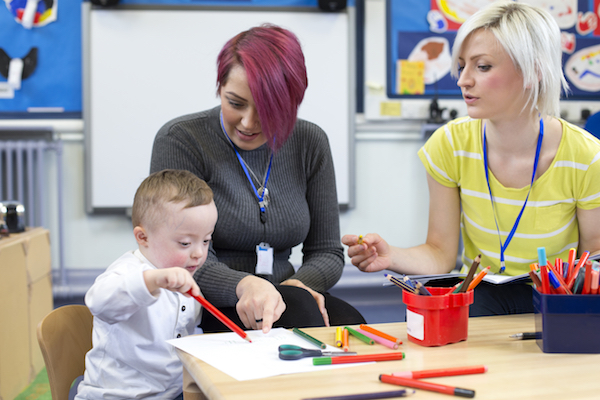 When I hear the dreams of parents of a child with a disability, they often share a hope for belonging for their son or daughter. They have a desire for their child to belong to a community, marked by genuine friendships, after-school activities, valuable classroom learning, and ultimately, an encounter with God’s love. Truthfully, their dreams are not any different than any parent’s dreams for their child.
When I hear the dreams of parents of a child with a disability, they often share a hope for belonging for their son or daughter. They have a desire for their child to belong to a community, marked by genuine friendships, after-school activities, valuable classroom learning, and ultimately, an encounter with God’s love. Truthfully, their dreams are not any different than any parent’s dreams for their child.
In Christian schools especially, we have the opportunity—the joy—of sharing with these parents that their children belong to God! And because all of us belong to God, we belong to each other, regardless of perceived ability. First Corinthians 12:24b–27 (NIV) shares a beautiful example of the command to mutually belong to one another:
“But God has put the body together, giving greater honor to the parts that lacked it, so that there should be no division in the body, but that its parts should have equal concern for each other. If one part suffers, every part suffers with it; if one part is honored, every part rejoices with it. Now you are the body of Christ, and each one of you is a part of it.”
However, we know that fear can get in the way of belonging. When I talk with administrators, they often have questions about how a student will be supported academically or behaviorally, how a school will fund additional staffing, how other parents or peers will respond, or how the student will impact their school’s high achievement ratings. Though these are valid questions, it is often too tempting to avoid these potential issues altogether and not enroll that student.
Knowing Students Most Excellently
Creating places of belonging for students of all abilities is never complete with one answer to the questions of program, system, or funding. Rather, responding to this call means recognizing that we might never have all the answers—but committing to working together in that space anyways.
To belong to each other as we are called, we must move forward with courage. We can get caught up in designing such a beautiful system that we lose track of the beautiful diversity of every student. This is why we at CLC Network want to bring the focus back to a phrase we have used for years: “knowing students most excellently.”
Knowing students most excellently requires a different set of eyeglasses. And, thanks be to God, knowing a student with disabilities in our Christian schools means seeing them as God sees them—as an essential part of our community, as a child of God, as a friend, and a faithful follower with much to contribute.
Resources for Christian Schools
Rooted in this belief, we know schools will need a variety of resources in place. Here are some suggestions for such resources:
- Consider appointing a person—a special educator, or sometimes a talented teacher with a vision—to know and advocate on behalf of students with disabilities.
- Research 504 plans and when (or not) to use them.
- Check out our free Introduction to Inclusion in Christ-Centered Schools guide on our website.
- Review your support services with The Christ-Centered Educational Services standard.
But most of all, talk with parents about their goals for their kids, and share those goals with your teachers, brainstorming the possibilities together. Consider what you, as educators, believe is most important for this student in their unique journey. Equip your whole school with a Christlike lens for viewing their brothers and sisters—one rooted in mutual belonging. Find others who have been down this path before and compare notes.
As Christian schools, let us become known for following in Christ’s example of creating a community of belonging by knowing every student most excellently as a child of God. And, let us rejoice when that belonging changes an entire school.
[Editor’s Note: This post is part one of a two-part series; in part two, Carolyn Beall from Annapolis Area Christian School describes how supporting students with disabilities has changed their school.]
Additional Resources
- Watch Including Isaac, the story of a young man with a disability and his influence on his school community.
- Read Thomas Hoeksema’s “Radical Shifts: New Ways of Thinking About Disability and Schooling” on pages 3-4 of the Christian Educators’ Journal, 46(3).
About the Author
 Elizabeth Lucas Dombrowski is the executive director of CLC Network, equipping congregations and schools to glorify God through purposeful, innovative inclusion of persons of varied abilities. CLC Network partners with Christ-centered schools across the country to support their students, and welcomes conversations and questions about inclusion of students of all abilities. Elizabeth can be reached at edombrowski@clcnetwork.org.
Elizabeth Lucas Dombrowski is the executive director of CLC Network, equipping congregations and schools to glorify God through purposeful, innovative inclusion of persons of varied abilities. CLC Network partners with Christ-centered schools across the country to support their students, and welcomes conversations and questions about inclusion of students of all abilities. Elizabeth can be reached at edombrowski@clcnetwork.org.

